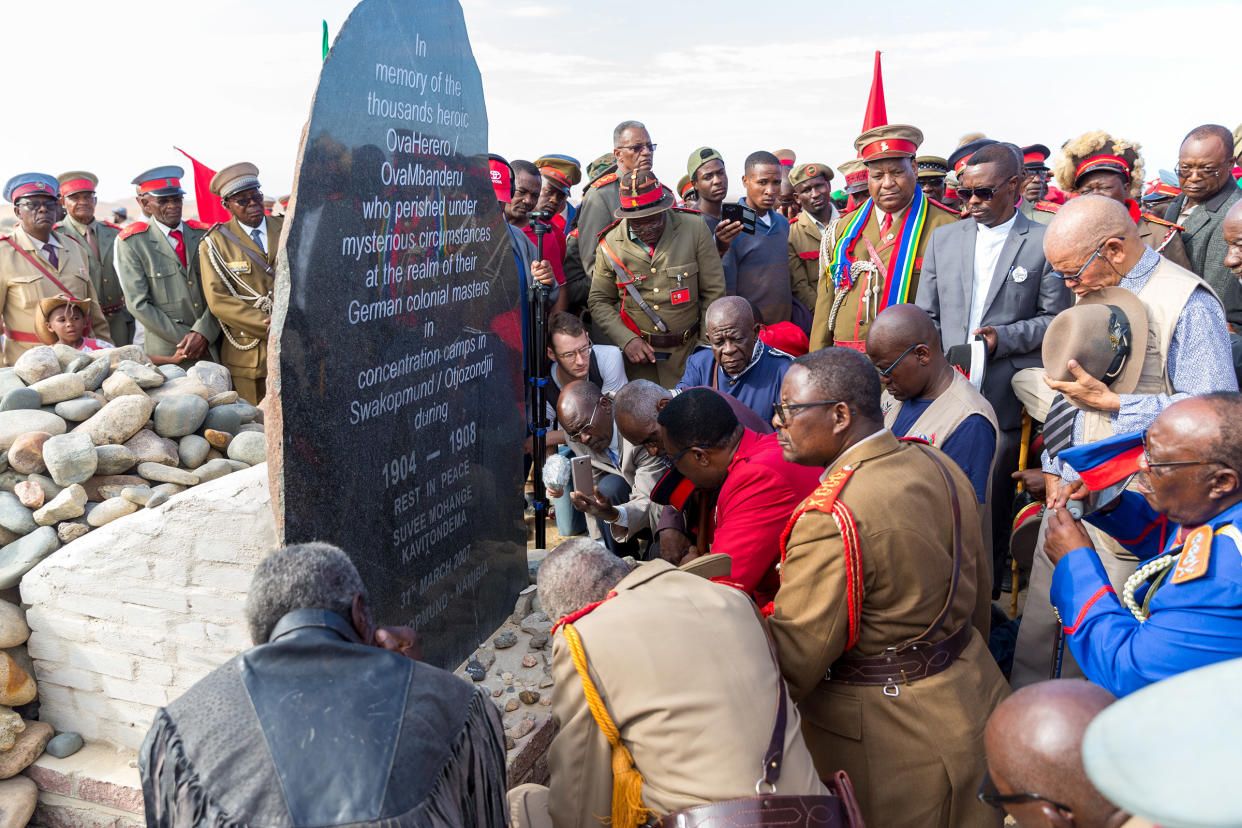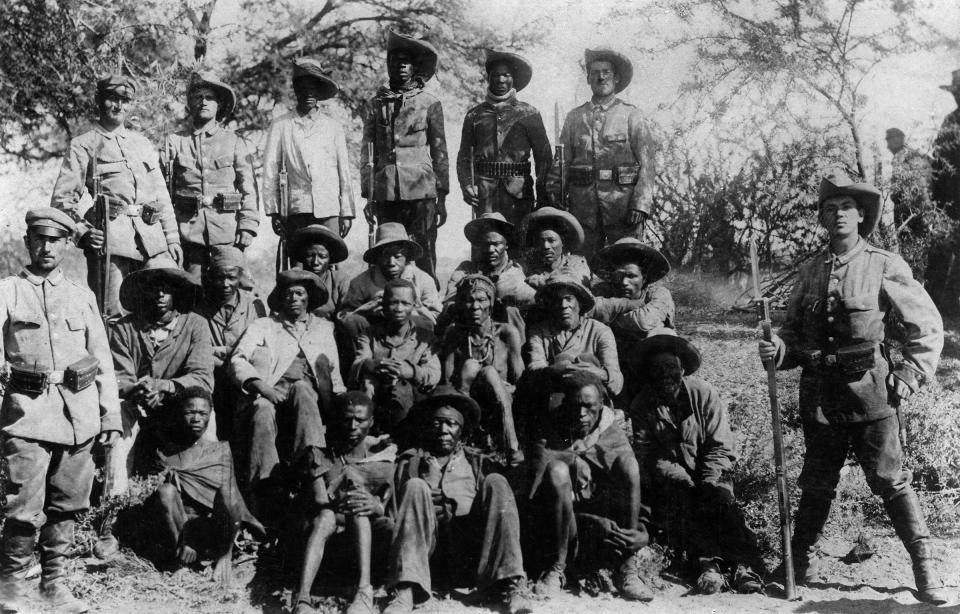Germany Has Officially Recognized Colonial-Era Atrocities in Namibia. But For Some, Reconciliation Is a Long Way Off

Paramount Chief Adv. Vekuii Rukoro, high-ranked chiefs and other members of the Herero and Nama communities gather around a monument in honor of the Ovaherero and Nama people that were victims of the genocide by German colonial forces at the Swakopmund Concentration Camp Memorial, in Swakopmund, Namibia, as a part of the Reparation Walk 2019 on March 30, 2019. Credit - Christian Ender—Getty Images
The German government formally recognized colonial-era atrocities against the Herero and Nama people in modern-day Namibia for the first time, referring to the early 20th century massacres as “genocide” on Friday and pledging to pay a “gesture to recognize the immense suffering inflicted.”
“In light of the historical and moral responsibility of Germany, we will ask Namibia and the descendants of the victims for forgiveness,” said German Foreign Minister Heiko Maas in a statement, adding that the German government will fund projects related to “reconstruction and the development” of Namibia amounting to €1.1 billion ($1.3 billion). The sum will be paid out over 30 years and must primarily benefit the descendants of the Herero and Nama, Agence France-Presse reported.
Although it’s a significant step for a once colonial power to agree such a deal with a former colony, there’s skepticism among some experts and observers.
“I have an ambivalent reaction to this,” says Olivette Otele, professor of the history of slavery at the University of Bristol, U.K., and author of African Europeans: An Untold History. “It means that the conversation is ongoing, but I’m assuming and I want to believe that this is not the end. It’s not a case of doing one gesture, and then everything’s forgotten, because that wouldn’t work in terms of reconciliation and bringing communities together.”
What happened to the Herero and Nama people?
Between 1904 and 1908, German colonial forces killed, tortured and displaced thousands of Herero and Nama people in what some historians have called the first genocide of the 20th century. After an uprising against brutal German settler colonial rule in what was then known as German Southwest Africa, many Herero were forced into the Omaheke Desert and left to die of starvation and thirst. Thousands of Nama later suffered a similar fate. Those who survived were imprisoned in concentration camps, where they were subjected to sexual violence, forced labor and medical experiments by German officials, with the aim of exterminating the indigenous people. As many as 60,000 Herero—more than 80% of the group’s total population living in German Southwest Africa at that time—and 10,000 Nama—50% of the population—are estimated to have died.
Since the atrocities, the descendants of the Herero and Nama people have struggled to secure a formal apology, reparations or meaningful reconciliation offers from the German government. The 1985 United Nations’ Whitaker Report classified the campaign against the Herero as a genocide, and in 1988, Germany’s then-president, Roman Herzog, met Herero leaders in Namibia but stopped short of a formal apology. In 2001, representatives of the Herero people filed a $4 billion lawsuit against the German government and two German firms in the U.S., but the claim was dismissed. Another lawsuit filed in New York was dismissed in 2019. In 2018, Germany returned the human remains of Herero and Nama people who were killed during the genocide to Namibia. The remains had been stored in hospitals, museums and universities for decades and had originally been sent to Germany for discredited, racist and pseudo-scientific experiments that sought to prove racial hierarchies.

‘No recognition without reparations’
On the 100th anniversary of the genocide in 2004, German politician Heidemarie Wieczorek-Zeul identified the atrocities committed as genocide, adding that “we Germans accept our historical and moral responsibility and the guilt incurred by Germans at that time.” Talks between the governments of both countries have been ongoing for years, punctuated with debates and disagreements over formal apologies, reconciliation and reparations.
In August last year, the Namibian government rejected a German offer of compensation for the atrocities, reportedly totalling €10 million ($12.1 million). At the time, Namibia’s president Hage Geingob said that the offer “for reparations made by the German government … is not acceptable” and needed to be “revised.” Notably, Friday’s statement from Germany’s foreign ministry avoided the term “reparations,” a term of contention between the two countries.
What constitutes reparations is understood in different ways by different people. “Memory scholars, historians and grassroots organisations think in terms of reparative justice,” says historian Otele. “The legacy of the past cannot be repaired through just money—there’s education, health, environmental considerations, and the preservation of community livelihoods. There are so many things that can be done that won’t be included in that package.”
There’s also the question of inclusion, and who has truly been represented in these negotiations, billed as a landmark agreement. Ahead of the formal announcement of the agreement, local Namibian media outlets reported that some government-recognised traditional leaders, who were consulted during negotiations, refused to endorse the deal. One unnamed chief was quoted as saying that “what is being offered is too little, an insult to our community and totally different to what we, the chiefs, have agreed on.” Herero paramount chief Vekuii Rukoro also told Reuters the reported agreement was a “sellout.”
For writer and academic Zoé Samudzi, who has just completed a PhD on how the effects of the genocide of the Herero and Nama people have endured in the present-day, the agreement represents a hollow victory, “if you can even call it that.” She points out that the financial package has been framed around development and infrastructure, rather than compensation for the atrocities and for survivor communities. Henning Melber, a scholar of Namibian history, tweeted that the 30-year financial package in this new agreement wouldn’t represent a step change in German aid contributions to Namibia, because it’s roughly equivalent to the amount Germany has put on record as development aid for Namibia over the last three decades.
“Herero and Nama traditional leadership are rejecting this, because they have been adamant for many years about no recognition without reparations,” says Samudzi. “We should not even have the words reconciliation in our mouths,” she says. “Any conception of reconciliation in this moment is simply a way for Germany to absolve itself, and to not have to think about the ways that this genocide was incredibly formative for a lot of other German state violence.”

Former colonial powers slow to act
The acknowledgment from Germany comes at a time of reckoning over imperial history across the continent. This has manifested through debates about the repatriation of objects looted in violent colonial expeditions, the inclusion of imperial history in school curriculums, and the presence of statues of colonizers and slave traders in public spaces, as well as formal apologies for past racist violence and slavery.
On Thursday, French President Emmanuel Macron publicly acknowledged France’s “overwhelming responsibility” in the 1994 Rwandan genocide in a trip to the country’s capital Kigali. Yet survivors were critical of Macron’s failure to clearly apologize for his country’s role, after an independent report commissioned by his government concluded that France was “blind” to atrocities in Rwanda.
“We just saw France, not apologizing for what it did in Rwanda, but already asking for forgiveness,” says Samudzi. “And Germany is doing very similarly, through acknowledging and using the ‘G’ word [genocide], but being very quick to reject the possibility of meaningful compensation for the survivor communities.”
Otele says that, while the developments in Germany should put pressure on other governments to examine their pasts, the reality is that some political systems across Europe are stagnant, reluctant or slow to move on these issues. Imperial nostalgia is also still prevalent within some societies: A 2020 poll found a third of people in the U.K. believed Britain’s colonies were better off for being part of an empire, and that Britons were more likely to say they would like their country to still have an empire compared with people living in other former colonial powers.
Otele, a Cameroonian citizen, says the history of German colonization in the country of her birth in the 19th century has been significantly underexplored. “It will be interesting to see how Germany addresses other stories,” she says, adding that the conversations around these issues in broader society, particularly at the institutional level in some museums and universities in the U.K., are a positive sign. “It’s not perfect. There’s so much more to be done. But the conversation is actually happening rather than avoiding it.”


